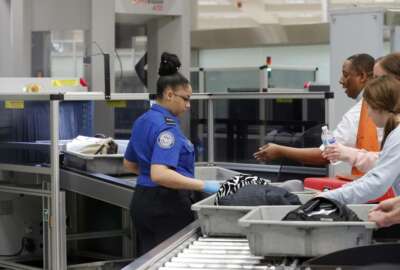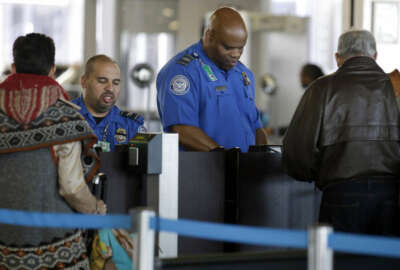
Hubbard Radio Washington DC, LLC. All rights reserved. This website is not intended for users located within the European Economic Area.
Hubbard Radio Washington DC, LLC. All rights reserved. This website is not intended for users located within the European Economic Area.
A bill under debate in Congress right how would move transportation security officers to Title 5 and into the General Schedule system, presumably giving them a ...
Best listening experience is on Chrome, Firefox or Safari. Subscribe to Federal Drive’s daily audio interviews on Apple Podcasts or PodcastOne.
Transportation Security Officers, or TSO’s, aren’t all that well paid relative to other federal law enforcement people. And although they have union representation, they don’t have the full rights of regular Title 5 federal employees. A bill under debate in Congress right now would move the officers to Title 5 and into the General Schedule system, presumably giving them a raise. With what the officers think, president of the American Federation of Government Employees Local 333, Joe Shuker, spoke with Federal Drive with Tom Temin.
Interview transcript:
Tom Temin: Mr. Shuker, good to have you on.
Joe Shuker: Thanks for having me.
Tom Temin: And you also are a regional vice president, so you cover a lot of territories in your union related work.
Joe Shuker: Yeah, I do. I cover from Pennsylvania to the Carolinas, I have six category x airports, and ports under me — just to the Carolinas, basically, and then west to Tennessee.
Tom Temin: And as a TSO yourself, are you also doing shifts ever on duty?
Joe Shuker: I am, yes.
Tom Temin: And before we get into the details of what they’re talking about in Congress, just give us a quick report on how things are in airports now as suddenly people are starting to fly. And the couple people I’ve known in the last few days that have flown couldn’t believe the crowds at the airport, and how mobbed the planes are.
Joe Shuker: You’re correct. I mean, passenger flow has definitely picked up increasingly every week it seems. And with this week, probably being the heaviest. So we lost a lot of people during COVID, so we’re kind of shorthanded. And we’re trying to hire right now, but we can’t seem to get anybody. They’ll try and hire 12 people for a class, that’s the limit with COVID now, in Philadelphia anyway. And a half of them will show up, sometimes less than half, we’ll get four or five people showing up. So that’s a hurdle. Just getting enough people hired and trained in time for the summer is going to be an issue.
Tom Temin: Sure. And do you think that one of the issues is the pay levels that people come in as entry level TSOs?
Joe Shuker: It’s got to be. I mean, we’re competing now with local convenience stores, stuff like that. They’re coming in at $13 an hour or something like that, which isn’t real competitive. It’s a stressful job here, the hours aren’t great. People are going into work at 4am, which means maybe a 2:30am wake up call. So it certainly hurts us, the level of pay. Once we hire, we lose people because of them going on to another job, even another federal agency that pays more. So we have a huge turnover at TSA, which is really troubling. If we could keep our guys here, it won’t be nearly as bad. But people leave for higher pay,
Tom Temin: And how our labor relations generally with what you are able to negotiate? I guess it’s been about seven, eight years now since AFGE was voted into represent TSO. How our labor relations with TSA?
Joe Shuker: So our last CBA negotiations were an absolute joke. There was no real negotiations, we were handcuffed. We work under this determination which basically says that TSA doesn’t have to follow any federal laws. For instance, they could discriminate if they wanted to, they say they don’t, but they could, and that was put in place at the start of TSA and most of it was basically because they know what they were going to face in hiring practices or meeting quotas, stuff like that, may have hindered on getting it up and running. But 20 years later, they don’t need this power. They have pretty much absolute power. And our last negotiations, they set the rules on negotiations. So we had 90 days to negotiate a contract. And if we didn’t vote yes for the contract, we didn’t have a contract for three more years, we weren’t eligible for a contract for three more years. So it was a take it or leave it negotiation. So if H.R.903 passes, which we believe it will, that will give us full collective bargaining rights.
Tom Temin: We’re speaking with Joe Shuker, he’s president of the American Federation of Government Employees Local 333 and a Transportation Security Officer. So give us a little bit more detail on what you envision.
Joe Shuker: So if and when, I should say when, H.R.903 passes, we will then have full collective bargaining rights. Right now, if a TSO gets fired, they can’t take it to a third party, which is the Merit Systems Protection Board, for an appeal. TSA has their own board that’s made up with local managers or AFSDs. So they’re basically just reading over a decision and agreeing with the decision of somebody else from TSA. There’s no real third party eyes, they rarely get overturned. We don’t have a chance to go to a third party arbitrator or neutral party, where if our managers got fired, they do have that right. Seems totally unfair.
Tom Temin: So that’s one issue, and pay levels I guess under Title 5 would be different. Anything else that you would seek in a normal negotiation for a work agreement?
Joe Shuker: So as far as pay levels go, under Title 5 we would have scheduled raises determining on the length of service you’re here, right. So TSA has come out with some plan. Most of the TSA shows, in Philadelphia alone, 90% of us are at the bottom of our pay bend, which is hard, right. So for years, they had a right, which they say, more flexibility and pay, but they’ve never done it – they’ve never given us pay. Now, I don’t know, pretty sure managers and above or headquarters got raises, which are flexible in this TSA, pay scale. The TSOs have never gotten it.
Tom Temin: And do you think that this translates down to morale issues on the job?
Joe Shuker: So it definitely does. Now morale, if you’re struggling to make ends meet, or if you have to pick up hours, which a lot of officers do here, the ability to work somebody else’s shift, the level of exhaustion is one thing, right. They’re tired, they’re not able to pay their bills. So they’re stressed there now coming into a stressful job. So there’s a lot of stressing out, right. So that’s a morale killer to begin with before you even step in the door. Now you have supervisors and managers who actually, a lot of them don’t know the rules, and they just make up their own rules. And it’s pretty much they’re able to fire you almost at will here, especially as a new hire. Like they have a two year probation period here where they can let you go for any reason at all. They don’t have to really give you a reason why they’re letting you go. It could be like, well we don’t feel like you’re doing the job well, and therefore we don’t like it. We don’t like your attitude. And they could just fire you. And there’s no appeal right there. It’s demoralizing to say the least.
Tom Temin: Plus, you have to deal with the public, which is not very much fun a lot of times in an airport situation.
Joe Shuker: Right. So in the beginning of COVID, we didn’t have the right to tell passengers coming through that they had to wear a mask, we had to pat them down if they had a mask or not, which is crazy. And then we got a lot of love from passengers during the government shutdown when we were working without pay, right. We went through that period where we had to show up for work and not get paid. We did get a back pay but that wasn’t guaranteed., and people were struggling to get the work. We’re at the low end of a pay scale where people struggle to make ends meet week to week, and now you take their pay and rent money away. They don’t have gas money to come to work, that kind of thing. So people were struggling, we were on edge, but the passengers couldn’t have been better during that, right. They were coming in donating stuff to us and thanking us, that kind of thing. But that’s short lived. Now things are back to normal, right. So now people are flying and they’re in a rush, the same thing. They’re trying to get through, they didn’t give themselves time enough to get to the airport, possibly now there’s a long line, and they’re taking it out on the TSOs.
Tom Temin: Alright, so the main message then for Congress to have is pass H.R.903.
Joe Shuker: H.R.903 would boost morale here incredibly. Not only will we have scheduled raises, pay will be higher. Now there’s a provision in 903, which says we can’t get paid less than we do now, right, which is pretty important because we didn’t want that passing and then being set at a lower grade. So the raises TSA gives people now, they’re given the biggest raises to the people and like this three to seven year mark that are careers here in order to retain them cause there the people who leave. Now the people who have been here 20 years aren’t getting those raises, right. They’re feeling left out and underappreciated. We’re here from the beginning, from day one, yet the people just walk in the door are getting a higher rate than the people who’ve been here 20 years. So it doesn’t make a lot of sense to me.
Tom Temin: Joe Shuker is president of the American Federation of Government employees Local 333 and a Transportation Security Officer, thanks so much for joining me.
Joe Shuker: Thank you.
Copyright © 2024 Federal News Network. All rights reserved. This website is not intended for users located within the European Economic Area.
Tom Temin is host of the Federal Drive and has been providing insight on federal technology and management issues for more than 30 years.
Follow @tteminWFED

